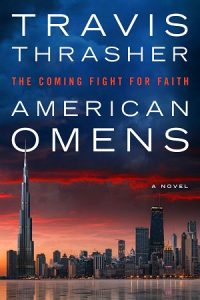The book has received several great endorsements from noted authors. But then you have Jerry B. Jenkins—the co-creator of Left Behind—calling American Omens “as fresh and relevant as Left Behind was more than twenty years ago.” That’s amazing, right? How does an author process THAT?
 Yeah, that IS amazing. I think I’m still processing that, to be honest.
Yeah, that IS amazing. I think I’m still processing that, to be honest.
Jerry has been a mentor and a friend ever since I worked with him at Tyndale House in author relations. He was always encouraging me in my writing, even when my material was pretty subpar. I asked him a couple of times over the years to endorse a book, but he hadn’t yet.
Jerry once volunteered to help edit an early book of mine, but at the time I wanted to keep it as it was. I know he doesn’t put his name on any book, so seeing his kind endorsement was thrilling. Having him reference Left Behind was really generous and affirming.
Over the years, you’ve written so many different kinds of books—including thrillers and mysteries, as well as stories of people forced to stand up for their faith in times of conflict or trauma. Is it fair to say American Omens is a culmination of those books?
 Great question. I hadn’t thought of it in that way, but now that you mention it, I guess it might just be a culmination of all the novels I’ve written. I know I needed to pour everything I could into American Omens since it’s such an amazing opportunity having Random House publishing it.
Great question. I hadn’t thought of it in that way, but now that you mention it, I guess it might just be a culmination of all the novels I’ve written. I know I needed to pour everything I could into American Omens since it’s such an amazing opportunity having Random House publishing it.
I couldn’t help making it a Travis Thrasher book, however, meaning it doesn’t fit into the neat box of a “thriller” or a “suspense” novel. There are some things I did that I’ve always done in my fiction, for better or worse. Thankfully the editors helped to get these characters and storylines into great shape.
Even though I imagined American Omens as book one in a series, I made sure to have it be a strong story that works on its own. It doesn’t end with a cliffhanger like my teen series. I’m not sure if there will be more—none are under contract.
Obviously if the response is strong enough, then the publisher will want more. Left Behind started as a one-book contract, so…you just never know.
Some of your books have been either biographies or based on real people and events. How much does working on these kinds of books impact your fiction?
Every book I work on is a learning experience. Not just learning about the form of writing, but learning about life.
Collaborating with others on memoirs allows me to walk in someone else’s shoes. I’ve worked with actors, athletes, politicians, businessmen, pastors, comedians, filmmakers, musicians… Talk about all the variety of characters who have invited me into their lives!
Everything in my life informs the fiction I’m working on at the time. I’m not the young dreamer who wrote The Promise Remains 20 years ago, nor am I the jaded publishing guy who penned Sky Blue.
My own faith journey is reflected in American Omens as well as some of the realities of what’s happened to me the last few years. It’s fun putting real life into fiction and then blurring the lines of reality.
What do you hope readers come away with after reading American Omens?
More than anything, I hope Christian readers will come away with a renewed sense of urgency in their faith. For readers who might be searching and wondering in their own lives, I hope this opens a door for them to continue to ask questions and look for answers.
I’ve always said that fiction can be criticized enough simply because it’s difficult to pull off, but when you have “Christian fiction,” then you’ll be critiqued based on the faith component of your story.
I stopped worrying about that long ago. If someone says this book is preachy, so be it. Hutchence likes to spout out his views on the world, but then again, lots of people do that.
On the next page, Travis outlines the challenges of writing so many types of books. Click through to continue!


